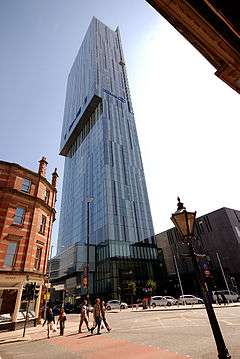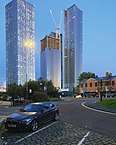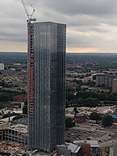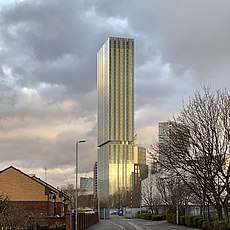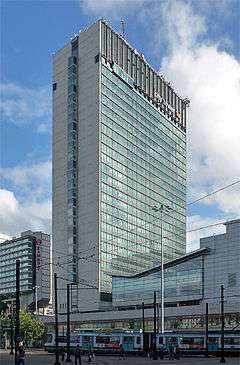St Paul's Methodist Church, Didsbury
St Paul's Methodist Church is a former Methodist church in the Manchester suburb of Didsbury. The building was designed by the architect H.H. Vale as a church for the nearby Wesleyan Theological Institution and opened in 1877. The building was converted into an office space in 1990. It is recorded in the National Heritage List for England as a designated Grade II listed building.[1]
| St Paul's Didsbury | |
|---|---|
The spire of St Paul's Didsbury | |
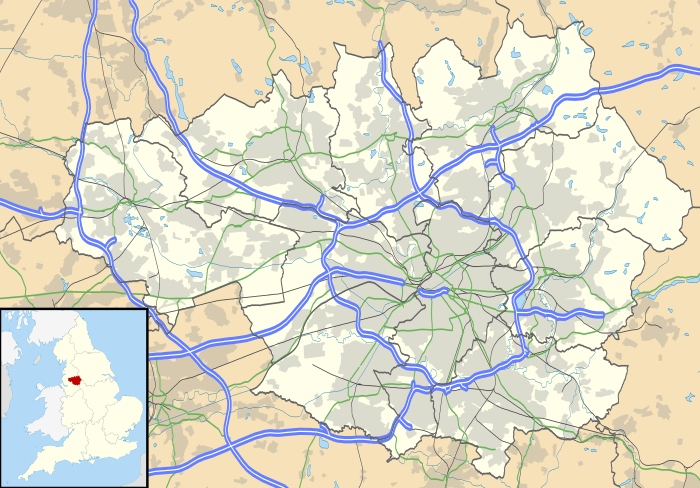 St Paul's Didsbury Location of St Paul's in Greater Manchester | |
| 53.4130059°N 2.230219°W | |
| Location | 781 Wilmslow Road, Manchester M20 2RW |
| Country | United Kingdom |
| Denomination | Former Methodist Church |
| History | |
| Former name(s) | St Paul's Methodist Church, Didsbury |
| Status | Former church |
| Founded | 1877 |
| Dedication | St. Paul the Apostle |
| Events | 1990: converted to office space |
| Architecture | |
| Functional status | Office conversion |
| Heritage designation | Grade II[1] |
| Designated | 3 October 1974 |
| Architect(s) | H.H. Vale |
| Style | Gothic Revival |
| Groundbreaking | 1875 |
| Completed | 1877 |
| Construction cost | £20,000 |
| Closed | 1987 |
| Specifications | |
| Materials | Sandstone |
| Administration | |
| District | Manchester and Stockport District |
History
St Paul's Church was built as a memorial to the local philanthropist and MP, James Heald of Parrs Wood.[2] It was designed by the Liverpudlian architect H.H. Vale, who at the time was also collaborating with Cornelius Sherlock on the design of the Walker Art Gallery in Liverpool. During the project, Vale committed suicide, and the church was completed by T D Barry & Sons. Construction lasted from 1875 to 1877.[3][4]
Architecture
_(26414594281).jpg)
Built in the Victorian Gothic style, Vale's church displays freely interpreted elements of Early English and Geometrical Decorated Gothic architecture. The layout is cruciform with a belfry and steeple on the south-west corner. The stonework is sandstone and architectural elements typical of the style are used throughout, such as lancet windows and foliar decoration, with dormer windows along the nave.[3][5]
The interior is noted for its arcades of polished Aberdeen granite and Irish marble columns with carved capitals, encaustic tiled floors, a painted panelled barrel roof, richly carved stonework which features fruit and foliage inhabited with animals and birds, a stone pulpit resting on granite shafts, a baptismal font of Caen stone and a marble reredos. The interior walls are of Hollington stone. The church also includes several wall monuments to "tutors of this college".[3][5][6]
The office conversion, which was carried out by the firm Downs & Variava in 1990, has been criticised favourably; the insertion of mezzanine floors is regarded as sympathetic to the spacious interior by the retention of the area under the crossing to roof height.[3]
Modern use
The building is occupied today by a pipeline simulation & leak detection company, Atmos International.
Present-day church
Although the Victorian church building has now been put to secular use, Christian worship continues on the site at the neighbouring Didsbury Methodist Church, a small brick building dating from 1961.[4]
References
- Historic England. "Didsbury Methodist Church of St Paul (1254966)". National Heritage List for England. Retrieved 15 February 2017.
- France, E.; Woodall, T.F. (1976). A new history of Didsbury. Didsbury, Manchester: E.J. Morten. p. 177. ISBN 0859720357.
- Hartwell, Hyde & Pevsner 2004, p. 443.
- "Who Lives in a Church Like This?". TBWA\Manchester. 14 January 2015. Archived from the original on 15 February 2017. Retrieved 15 February 2017.
- Stuff, Good. "Didsbury Methodist Church of St Paul - Manchester - Manchester - England". British Listed Buildings. Retrieved 15 February 2017.
- "Wesleyan College Chapel Didsbury Near Manchester – Mr H.H. Vale FRIBA, Architect, Liverpool". The British Architect: A Journal of Architecture and the Accessory Arts. 2: 185. 1 January 1874. Retrieved 23 February 2017.
Bibliography
- Hartwell, Clare; Hyde, Matthew; Pevsner, Nikolaus (2004). Lancashire: Manchester and the South-East. Yale University Press. p. 443. ISBN 0300105835. Retrieved 15 February 2017.CS1 maint: ref=harv (link)
External links
| Wikimedia Commons has media related to Didsbury Methodist Church. |
- Illustration of the Wesleyan College Chapel, Didsbury, Lancashire (The British Architect: A Journal of Architecture and the Accessory Arts, Volume 2, 1874)
- Didsbury Methodist Church - website of the present-day church
- "New Atmos Head Office - EN Blog". Atmos International. Archived from the original on 15 February 2017. Retrieved 15 February 2017. - photographs of the converted office interior

